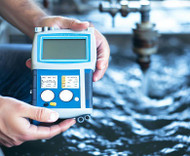Water Quality Meters for Industrial Applications: Ensuring Compliance and Efficiency
Posted by David Cannon on 1st Aug 2023

Water quality management is a critical aspect of industrial operations, serving as the foundation for compliance with environmental regulations, maintaining operational efficiency, and safeguarding public health. In various industrial sectors, such as manufacturing, power generation, and chemical processing, the use of accurate and reliable water quality meters is paramount for monitoring and assessing the quality of water used in processes. These meters enable businesses to identify potential contaminants, track pollutant levels, and implement necessary corrective measures to ensure compliance while optimizing their operations.
Water Quality Meters: Importance of Water Quality Management:
- Regulatory Compliance: Industries are subject to stringent environmental regulations governing the discharge of harmful substances into water bodies. Water quality meters play a crucial role in monitoring key parameters, including pH, turbidity, dissolved oxygen (DO), and conductivity, to ensure compliance with these regulations. By continuously monitoring these parameters, industries can identify deviations and take prompt corrective actions, preventing potential violations and associated penalties.
- Operational Efficiency: Monitoring water quality parameters is essential for optimizing industrial processes, reducing energy consumption, and minimizing waste generation. By tracking parameters such as pH, DO, and conductivity, businesses can detect inefficiencies, leaks, or process malfunctions that may affect overall productivity. Taking proactive measures to address these issues can lead to improved operational efficiency, cost savings, and enhanced sustainability.
- Product Quality: Several industries, including food and beverage, pharmaceuticals, and electronics, rely heavily on high-quality water for their manufacturing processes. Water quality meters ensure the purity and consistency of water used in these industries, safeguarding the integrity and safety of their final products. Reliable water quality meters help detect any deviations in parameters such as pH, turbidity, or conductivity, allowing for immediate corrective actions to maintain product quality.
Parameters Monitored by Water Quality Meters:
Water quality meters are designed to measure a wide range of parameters that directly impact water quality. Here are some key parameters:
- pH: pH is a measure of the acidity or alkalinity of water. Industrial processes often have specific pH requirements, and deviations can affect the efficiency of chemical reactions or the performance of equipment. Water quality meters enable accurate pH measurement, facilitating appropriate adjustments to maintain optimal conditions.
- Dissolved Oxygen (DO): DO levels indicate the amount of oxygen available in water. Monitoring DO is crucial for industries such as aquaculture, wastewater treatment, and pulp and paper manufacturing, where oxygen levels significantly impact biological processes. Water quality meters with DO meters allow continuous monitoring and adjustment to ensure optimal conditions for these processes.
- Turbidity: Turbidity refers to the cloudiness or haziness of water caused by suspended particles. Monitoring turbidity is vital for industries that rely on clear water for processes such as cooling, boiler feedwater, or product cleaning. Water quality meters equipped with turbidity sensors provide real-time measurements, helping to detect changes and implement appropriate filtration or treatment methods.
- Conductivity: Conductivity is a measure of water's ability to conduct electrical current and is directly related to its mineral content. Monitoring conductivity helps identify changes in water quality due to the presence of dissolved solids, which may lead to scaling or corrosion issues in industrial equipment. Water quality meters with conductivity sensors enable continuous monitoring and timely intervention to prevent potential damage.
- Total Dissolved Solids (TDS): TDS represents the total amount of dissolved inorganic and organic substances in water. Monitoring TDS levels helps industries maintain water quality standards and prevent adverse effects on equipment and processes. Water quality meters equipped with TDS sensors provide accurate measurements, allowing businesses to take appropriate actions such as filtration or desalination when necessary.
Types of Water Quality Meters:
There are several types of water quality meters available for industrial applications, each designed to measure specific parameters accurately. Understanding the different types can help businesses choose the most suitable option for their specific needs. Here are some common types:
- Multiparameter Meters: These versatile meters can measure multiple parameters simultaneously, offering convenience and efficiency. They often include sensors for pH, DO, conductivity, and temperature, providing comprehensive water quality analysis. Multiparameter meters are particularly useful when monitoring multiple water sources or conducting comprehensive assessments.
- Portable Meters: Portable water quality meters are compact, handheld devices suitable for on-site monitoring. They allow for spot-checking water quality in different areas of an industrial facility or during fieldwork. Portable meters are practical for quick assessments, troubleshooting, or verifying the effectiveness of treatment processes.
- Online Continuous Monitoring Systems: Online water quality monitoring systems provide real-time data on water quality parameters. These systems involve permanently installed meters that are connected to a central control system. They enable automated data collection, alarms, and remote access for timely decision-making. Online monitoring systems are particularly valuable for industries where continuous monitoring is critical, such as wastewater treatment plants or large-scale manufacturing facilities.
- Laboratory Meters: Laboratories utilize precision water quality meters for detailed analysis and research purposes. These meters offer high accuracy and are often used for calibration and validation of other water quality meters. Laboratory meters are indispensable tools in quality control processes, ensuring the reliability and accuracy of water quality measurements.
Conclusion:
Water quality meters are indispensable tools for industrial applications, serving a dual purpose of ensuring compliance with environmental regulations while optimizing operational efficiency. By continuously monitoring parameters such as pH, DO, turbidity, conductivity, and TDS, industries can effectively manage their water resources, reduce waste, and minimize their environmental footprint. Selecting the appropriate water quality meter based on specific industrial requirements is crucial for achieving accurate measurements and long-term success. By prioritizing water quality management, industries can not only meet regulatory obligations but also thrive by protecting both their bottom line and the environment. The adoption of reliable water quality meters is a step towards sustainable and responsible industrial practices.
